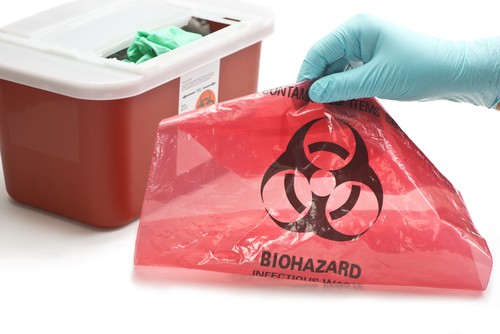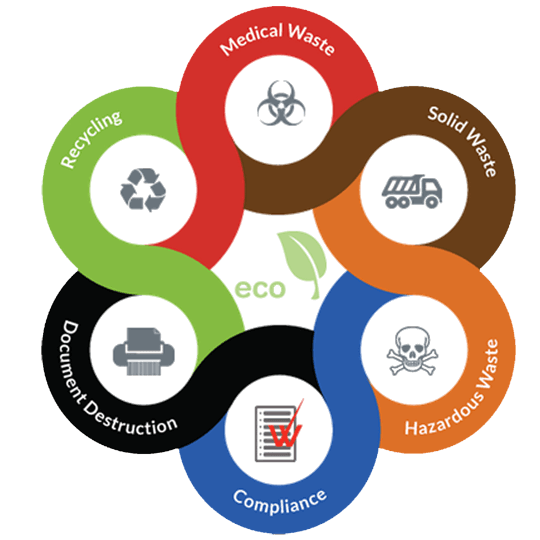Strategic Medical Waste Disposal Solutions: Supporting Safety And Security and Sustainability
Wiki Article
Making Certain Safe Handling and Disposal of Medical Waste
Ensuring secure handling and disposal of medical waste is of vital importance in health care setups. Improper monitoring of clinical waste can present significant dangers to the atmosphere, public health, and healthcare employees. In this introduction, we will certainly check out the relevance of appropriate clinical waste monitoring, the risks associated with inappropriate handling and disposal, as well as the guidelines and approaches that can be implemented to guarantee its risk-free disposal.Relevance of Proper Clinical Waste Administration
Correct clinical waste management is of utmost value in ensuring the safety and security and wellness of medical care experts, individuals, and the public. Clinical waste describes any kind of waste generated by healthcare facilities during the medical diagnosis, therapy, or immunization of pets or humans. This waste can posture serious health threats otherwise taken care of and taken care of effectively.
One of the key reasons correct clinical waste administration is essential is to stop the spread of transmittable diseases. Medical waste, such as used needles, infected dressings, and biological materials, can carry harmful microorganisms. Otherwise managed and dealt with appropriately, these microorganisms can be sent to medical care employees, patients, waste trainers, and also the basic public, leading to the prospective outbreak of diseases.
Furthermore, correct clinical waste administration aids shield the environment - medical waste disposal. Medical waste includes harmful materials, consisting of chemicals, drugs, and contaminated substances. When not taken care of suitably, these materials can infect soil, water bodies, and the air, presenting a considerable risk to ecosystems and public wellness
Moreover, reliable medical waste administration makes certain conformity with worldwide requirements and local policies. Governments and regulatory bodies have actually developed procedures and standards to guarantee the secure handling, storage space, transport, and disposal of medical waste. Complying with these guidelines is important to avoid lawful repercussions and preserve the track record and credibility of medical care centers.
Dangers of Improper Handling and Disposal

Individuals can also be exposed to these transmittable illness if clinical waste is not appropriately thrown away. For circumstances, if infected needles or other sharps are not thrown away in assigned puncture-proof containers, they might mistakenly puncture people, causing prospective infections. Furthermore, if medical waste is not segregated appropriately, there is a danger of cross-contamination between various kinds of waste, further raising the chances of condition transmission.
Inappropriate disposal of clinical waste can additionally have harmful impacts on the environment and the basic public. If clinical waste is not dealt with and thrown away correctly, it can contaminate water sources, soil, and air, causing the spread of contaminants and diseases. This can have long-lasting effects on communities and public wellness.
Standards for Safe Handling of Medical Waste
Applying reliable procedures for the secure handling of clinical waste is essential in making sure the protection of medical care specialists, people, and the public. These guidelines are crucial in decreasing the threats linked with the handling and disposal of medical waste, such as infections, injuries, and environmental contamination.Primarily, medical care facilities should establish a comprehensive waste monitoring strategy that complies with local, national, and worldwide laws. This strategy needs to include clear guidelines on waste partition, product packaging, transportation, labeling, and storage space. It is essential to divide different sorts of waste, such as sharps, transmittable products, drugs, and non-hazardous waste, to stop cross-contamination and advertise secure disposal.
Furthermore, healthcare workers should receive complete training on appropriate waste handling techniques. They should be educated on the prospective hazards of medical waste, the proper usage of individual safety devices (PPE), and the correct treatments for managing, transferring, and getting rid of different types of waste.
Moreover, health care facilities must frequently monitor and examine their waste administration methods to guarantee conformity with guidelines. This includes performing routine evaluations, examining waste handling treatments, and offering comments and training to personnel.
Efficient Strategies for Garbage Disposal
To make certain the risk-free handling and disposal of clinical waste, it is necessary to utilize efficient techniques for garbage disposal. Clinical waste can pose significant threats to public health and wellness and the atmosphere if not managed and taken care of correctly. Health care facilities and waste administration companies should execute suitable approaches to alleviate these dangers.It entails dividing different kinds of clinical waste based on their characteristics. Medical care facilities ought to give clear standards and training to staff members on just how to segregate waste correctly.

In addition, healthcare facilities need to collaborate with accredited waste management firms to guarantee correct disposal of clinical waste. These business have the experience and equipment required to securely get rid of and take care of of medical waste in compliance with laws and best methods.
Training and Education for Health Care Professionals
Healthcare experts play a crucial duty in making certain the secure handling and disposal of medical waste via extensive training and education. It is necessary for medical care service providers to have a deep understanding of the possible dangers related to clinical waste and the correct methods for its administration. By obtaining proper training, health care professionals can lessen the potential transmission of infectious illness, avoid ecological contamination, and safeguard both themselves and the public.
Moreover, training programs should highlight making use of personal safety tools (PPE) and appropriate hand health methods when managing clinical waste. medical waste disposal service. Healthcare specialists ought to understand exactly how to properly get rid of and utilize of PPE to protect themselves from potential exposure to hazardous materials. They ought to likewise be educated on the significance of routine handwashing and the correct usage of hand sanitizers to decrease the spread of transmittable diseases
Proceeding education and regular updates on medical waste administration methods are critical for healthcare specialists. As regulations and guidelines advance, it is necessary to maintain doctor informed about any changes in procedures and ideal practices. This will certainly make certain that they remain updated and maintain a high requirement of safety and security in disposing and handling of medical waste.
Verdict
To conclude, appropriate handling and disposal of medical waste is crucial to ensure the security of medical care professionals, people, and the environment. Neglecting to adhere to guidelines and guidelines can result in numerous dangers and hazards. Implementing efficient strategies for garbage disposal and providing appropriate training and education and his explanation learning for healthcare specialists are important in keeping a safe medical care atmosphere. By adhering to these techniques, we can alleviate the prospective risks related to clinical waste.Medical waste refers to any kind of waste created by medical care facilities during the medical diagnosis, therapy, or booster shot of people or pets. If medical waste is not set apart properly, there is a danger of cross-contamination in between various types of waste, additional boosting the opportunities of illness transmission.
It is essential to separate various kinds of waste, such as sharps, contagious products, pharmaceuticals, and non-hazardous waste, to avoid cross-contamination and promote risk-free disposal. WasteX Medical Waste Disposal.
To make sure the secure handling and disposal of clinical waste, it is crucial to utilize effective strategies for waste disposal. Additionally, healthcare centers must establish a regular waste collection and transport schedule to prevent waste build-up and minimize the danger of accidents or contamination.
Report this wiki page